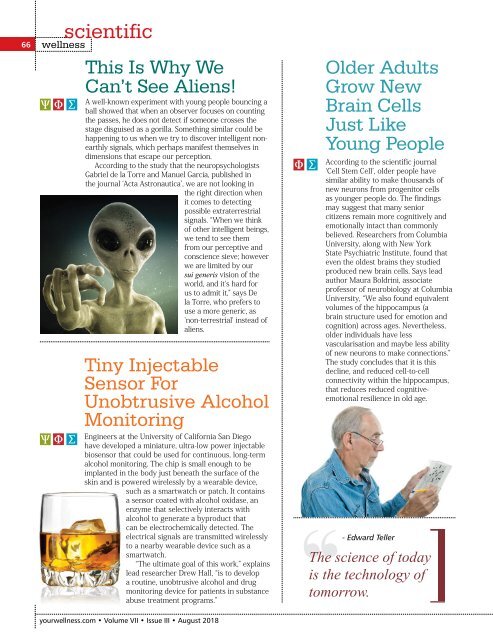Create successful ePaper yourself
Turn your PDF publications into a flip-book with our unique Google optimized e-Paper software.
scientific<br />
66 wellness<br />
This Is Why We<br />
Can’t See Aliens!<br />
A well-known experiment with young people bouncing a<br />
ball showed that when an observer focuses on counting<br />
the passes, he does not detect if someone crosses the<br />
stage disguised as a gorilla. Something similar could be<br />
happening to us when we try to discover intelligent nonearthly<br />
signals, which perhaps manifest themselves in<br />
dimensions that escape our perception.<br />
According to the study that the neuropsychologists<br />
Gabriel de la Torre and Manuel García, published in<br />
the journal ‘Acta Astronautica’, we are not looking in<br />
the right direction when<br />
it comes to detecting<br />
possible extraterrestrial<br />
signals. “When we think<br />
of other intelligent beings,<br />
we tend to see them<br />
from our perceptive and<br />
conscience sieve; however<br />
we are limited by our<br />
sui generis vision of the<br />
world, and it's hard for<br />
us to admit it,” says De<br />
la Torre, who prefers to<br />
use a more generic, as<br />
'non-terrestrial' instead of<br />
aliens.<br />
Tiny Injectable<br />
Sensor For<br />
Unobtrusive Alcohol<br />
Monitoring<br />
Engineers at the University of California San Diego<br />
have developed a miniature, ultra-low power injectable<br />
biosensor that could be used for continuous, long-term<br />
alcohol monitoring. The chip is small enough to be<br />
implanted in the body just beneath the surface of the<br />
skin and is powered wirelessly by a wearable device,<br />
such as a smartwatch or patch. It contains<br />
a sensor coated with alcohol oxidase, an<br />
enzyme that selectively interacts with<br />
alcohol to generate a byproduct that<br />
can be electrochemically detected. The<br />
electrical signals are transmitted wirelessly<br />
to a nearby wearable device such as a<br />
smartwatch.<br />
“The ultimate goal of this work,” explains<br />
lead researcher Drew Hall, “is to develop<br />
a routine, unobtrusive alcohol and drug<br />
monitoring device for patients in substance<br />
abuse treatment programs.”<br />
Older Adults<br />
Grow New<br />
Brain Cells<br />
Just Like<br />
Young People<br />
According to the scientific journal<br />
‘Cell Stem Cell’, older people have<br />
similar ability to make thousands of<br />
new neurons from progenitor cells<br />
as younger people do. The findings<br />
may suggest that many senior<br />
citizens remain more cognitively and<br />
emotionally intact than commonly<br />
believed. Researchers from Columbia<br />
University, along with New York<br />
State Psychiatric Institute, found that<br />
even the oldest brains they studied<br />
produced new brain cells. Says lead<br />
author Maura Boldrini, associate<br />
professor of neurobiology at Columbia<br />
University, “We also found equivalent<br />
volumes of the hippocampus (a<br />
brain structure used for emotion and<br />
cognition) across ages. Nevertheless,<br />
older individuals have less<br />
vascularisation and maybe less ability<br />
of new neurons to make connections.”<br />
The study concludes that it is this<br />
decline, and reduced cell-to-cell<br />
connectivity within the hippocampus,<br />
that reduces reduced cognitiveemotional<br />
resilience in old age.<br />
- Edward Teller<br />
The science of today<br />
is the technology of<br />
tomorrow.<br />
yourwellness.com • Volume VII • Issue III • <strong>August</strong> <strong>2018</strong>



